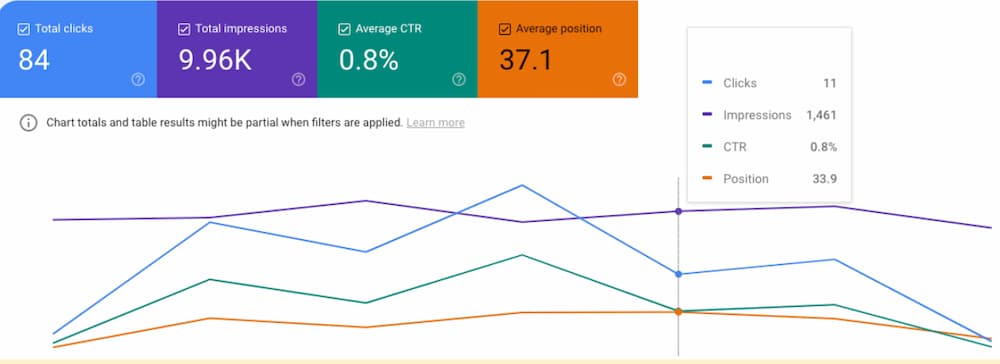Online marketing and search engine optimization (SEO) is continuously evolving, but one thing remains constant – the importance of keywords. However, not all keywords are created equal. Some are more valuable than others, and branded keywords are the most valuable. If you’re frustrated by your Google Search Console reports, wondering why your clicks for branded keywords are fluctuating or how to make the most of them, this article is for you.
My Website Spot, with over 18 years of experience in the SEO industry, has helped countless businesses and industries improve their SEO tactics. We’ll dive into branded keywords, answer your burning questions and shed light on how to leverage this essential aspect of SEO.
What is the difference between brand keywords and generic keywords?
Let’s establish a solid foundation by understanding what branded keywords are and why they matter.
Branded keywords are search terms that include your brand name or variations of it. For a smartphone brand like “TechMaster,” branded keywords could include searches like “TechMaster smartphones,” “TechMaster mobile phones,” or “TechMaster phone reviews.” These keywords explicitly include the brand name or its variations, making them branded keywords.
On the other hand, generic keywords are more general search terms that describe a category, product, or service without specifying a particular brand. Continuing with the smartphone example, generic keywords might include phrases like “best smartphones” or “smartphone reviews.” These keywords don’t mention a specific brand and are often used by users who are in the early stages of their search and haven’t decided on a brand yet.

Why do branded keywords matter?
Branded keywords are your secret sauce that can boost your brand’s online presence. Here are a few compelling reasons why:
- Brand Visibility: Branded keywords increase your brand’s visibility within search engine results pages (SERPs). When someone enters your brand name into the search bar, it’s a clear indicator of their existing interest in your offerings. It’s like having a prominent signboard on a busy street – it guides potential customers directly to your virtual doorstep, where they are more likely to explore what you have to offer.
- Competitor Protection: Ranking for your brand name protects against competitors who might attempt to seize the opportunity. Without this protective layer, your competitors could potentially dominate the search results with their ads or alternative content. This could divert valuable potential customers away from your site and into the arms of your rivals. Think of it as securing your prime retail space from encroaching competitors, ensuring your customers find you first.
- Trust and Authority: Users inherently trust familiar and established brands. When your website consistently ranks well for branded keywords, it sends a clear signal to users that your brand is reputable and reliable. Much like how a well-known, trusted local store attracts loyal customers, online users are more likely to click on familiar and trusted brands, strengthening your position as a go-to source in your niche.
How do you identify branded content?
- Specificity: Branded keywords are like the brand’s signature, highly specific, and directly tied to a particular brand. For instance, “Apple iPhone 13” is a branded keyword because it explicitly mentions the brand, “Apple.” In contrast, generic keywords are broad and don’t specify any particular brand. For instance, “smartphone reviews” is a generic keyword because it doesn’t mention any specific brand. Identifying branded content is all about spotting those keywords that are unique to a particular brand.
Awareness Stage
Consideration Stage
Once the customer has identified their problem, they move to the consideration stage. Here, they begin researching and evaluating various solutions or approaches to address their issue. This is where they start comparing different products or services, looking at reviews, and seeking more in-depth information.
Decision Stage
In the final stage, the customer is ready to make a decision. They’ve narrowed down their options and are now choosing a specific product or service to solve their problem. Factors like pricing, features, reviews, and brand reputation come into play during this phase.
- User Intent: When users search with branded keywords, it’s a strong indicator that they’re already familiar with the brand and are likely seeking specific products or information related to that brand. For example, if someone searches for “Nike running shoes,” it’s clear they know about the brand “Nike” and are interested in their running shoe offerings.
On the other hand, generic keywords like “best running shoes” suggest that users are in the early research or consideration stage. They’re exploring options before making a decision, making it important to tailor your content accordingly based on user intent. - Competition: Branded keywords typically face lower competition because they are exclusive to a specific brand. If you think about it, not many brands would target keywords that contain their competitor’s name. For example, if you search for “Coca-Cola,” you’ll likely see content directly related to Coca-Cola, not Pepsi.
In contrast, generic keywords often have higher competition because multiple brands and websites may target them. For instance, “soft drinks” is a generic keyword that could lead to various brands competing for visibility. Identifying branded content often means looking for keywords where your brand stands out in a less crowded field. - Conversion Rate: Here’s where it gets interesting. Branded keywords often come with a higher conversion rate because users searching for them are often more ready to take action, whether it’s making a purchase or engaging with the brand in some way. Think about someone searching for “Netflix subscription” – they’re probably ready to sign up.
Generic keywords, however, may have a lower conversion rate because users might still be in the early stages of their buying journey. For instance, someone searching for “streaming services” might still be comparing options. Identifying branded content can help you focus on keywords that are more likely to lead to conversions.
Why is branded search important?
Brand keywords are specific to a particular brand and often result in higher conversion rates, while generic keywords are broader and can help attract a wider audience. Depending on your goals and target audience, you may need to balance your optimization efforts between these two types of keywords to maximize your online success.
Why Are My Clicks Decreasing for Branded Keywords, Even Though I Still Hold the Same Position?
Imagine you’re running a popular online fashion store, “Fashion Haven.” You’ve noticed a perplexing trend in your Google Search Console – clicks for branded keywords like “Fashion Haven” or “Fashion Haven dresses” have dropped, despite your website maintaining its top position in search results. It’s disheartening, but here’s what might be happening.

- Seasonal Trends or Industry Shifts
Seasonal fluctuations or changes within your industry can significantly impact the number of clicks for branded keywords. If it’s summertime and your store, Fashion Haven primarily sells swimwear, users may not be actively searching for swimsuits during this period, causing a dip in clicks. It’s akin to ice cream shops having fewer customers in winter – it’s all about timing. - Competitive Landscape
The competitive landscape can change rapidly. The online fashion industry is highly competitive, and your rivals constantly refine their strategies. If a competitor launches an enticing ad campaign or improves their SEO tactics, users might click on their content instead, even if your position remains unchanged. Think of it as shoppers discovering a new store with an attractive display. - Algorithm Updates
Search engine algorithms evolve and can influence visibility and click-through rates, even when your position on the page stays the same. Just like how streaming services change their recommendation algorithms, search engines make adjustments. To navigate this, monitor trends, competitors, and algorithm updates closely.
Adapt your content to stay engaging and relevant, just like fashion trends, and you’ll maintain or improve your performance for branded keywords, even during click fluctuations. - Ad Content
The presence of ads in the search results can impact clicks. If new advertisements appear alongside your organic listing for branded keywords, users may click on these ads instead, even if you maintain your top position.
Continually monitor your website’s performance, especially for branded keywords. Keep a close eye on trends, competitors, and algorithm updates that might affect your click-through rates. Additionally, consider optimizing your content to remain engaging and relevant to users. By adapting to changing circumstances and staying vigilant, you can maintain and even improve your performance for branded keywords, despite fluctuations in click numbers.
Why Did I Suddenly Get an Increase in Branded Keyword Searches?
A surge in branded keyword searches is a promising indicator for your business, often resulting from a blend of factors. Notably, recent marketing efforts and online advertising campaigns can trigger heightened brand awareness and drive users to search for your brand specifically.
Additionally, the influential power of word of mouth, where satisfied customers and advocates recommend your brand, can spark curiosity, leading to a ripple effect of increased brand-related online searches. These circumstances emphasize the importance of understanding why there’s suddenly been an upswing in branded keyword searches.
- Marketing Efforts
If you’ve recently launched a new marketing campaign or invested in online advertising, it may lead to increased brand awareness and more people searching for your brand. Imagine you’ve recently launched a captivating advertising campaign showcasing your unique products or services under the brand name “EcoTech Gadgets.” This campaign catches the eye of potential customers, prompting them to search specifically for “EcoTech Gadgets.” Such a scenario highlights the significance of ongoing marketing strategies in driving brand recognition and prompting users to explore your brand further. - Word of Mouth
Word of mouth can have a significant impact on branded keyword searches. When satisfied customers or enthusiastic advocates of your brand recommend “EcoTech Gadgets” to their friends, family, or colleagues, it sparks curiosity. These referrals create a ripple effect, leading more people to search online using your brand name. Word of mouth acts as a powerful endorsement and can be a driving force in boosting brand awareness and attracting new customers.
- Existing Customers
Your existing customers may search for your brand when they want to revisit your website. Loyal customers who have previously interacted with your brand and experienced your products or services firsthand may frequently revisit your website by searching for “EcoTech Gadgets.” To harness the full potential of this increase, it’s essential to ensure that your website offers a seamless user experience, making it easy for returning customers to navigate and make repeat purchases.
Focus on improving your website to encourage more visitors to take action, like making purchases or signing up. Additionally, keep up your marketing efforts on platforms like social media and email to maintain and expand your brand’s online presence.

Why Should I Run Google Ads for My Brand Name if It Ranks in Position 1?
This is a common question among website owners who already have a strong organic presence for their brand. Running Google Ads for your brand name might seem redundant, but it offers several advantages:
- Blocking Competitors
Running Google Ads for your brand name is a strategic move to block competitors. By displaying your ads above your organic listing in Google search results, you effectively prevent competitors from diverting potential customers with their ads.
Picture this – you’ve built a solid reputation for your coffee shop, “Bean Buzz,” and when people search for it, they find your website at the top. But here’s the catch, your competitors want a piece of that buzz too. Running Google Ads for “Bean Buzz” ensures that when someone searches for your coffee shop, they see your ad right at the top. This means your competitors can’t sneak in with their ads and divert potential customers away. It’s like putting up a neon sign that says, “Bean Buzz – Come Right In!” and blocking any distractions. - Increased Visibility
Having both organic and paid listings for your brand name ensures maximum visibility. Some users prefer clicking on ads, while others trust organic results. Running Google Ads ensures you capture both segments of your audience. - Control Over Messaging
With Google Ads, you have full control over your ad content and messaging. This allows you to highlight specific promotions, incentives, or unique selling points that might not receive as much prominence in your organic listing, making your brand more appealing to potential customers.
Do brand keywords increase impressions?
Your organic listing is fantastic, but paid ads can shine even brighter at the very top of the search results. Some folks like clicking on those ads, while others prefer the organic stuff.
By having both, you’re like a coffee shop offering both classic brews and fancy lattes – you cater to everyone’s taste. So, running Google Ads alongside your strong organic presence increases your brand’s visibility, making sure no one misses your delicious coffee.
Are branded keywords worth it?
Absolutely! Google Ads grants you complete control over your ad content and messaging, an immensely valuable feature. This control translates into the ability to emphasize specific promotions, incentives, or distinctive selling points that might receive less prominence in your organic listing. It’s your chance to craft tailored messages that resonate with your audience, underlining the advantages of choosing your brand.
Let’s say “Bean Buzz” has a special deal – a buy-one-get-one-free offer on your famous mocha. With Google Ads, you have the power to shout about it. You can create an ad that screams, “Limited Time: Buy One Mocha, Get One FREE at Bean Buzz!” You might not be able to convey that prominently in your organic listing. It’s like putting up a flashy billboard next to your coffee shop, telling everyone about your irresistible offer.
How do you measure the success of branded content?
This platform provides comprehensive metrics, enabling you to precisely track your brand campaigns’ performance. You can assess click-through rates, conversion rates, and other key performance indicators (KPIs), allowing you to make data-driven adjustments and optimizations to ensure your brand ads are as effective as possible.

You get numbers and insights like how many people clicked on your ad, how many actually made a purchase, and what it cost you. It’s like having a dashboard in your coffee shop that shows you how many customers walked in, how many ordered your special mocha deal, and how much it cost to run that “BOGO” ad. With these measurable results, you can fine-tune your brand campaigns, ensuring they bring in the coffee-loving crowd effectively.
While you may already rank well organically, running Google Ads for your brand name can reinforce your online presence, protect against competitors, and provide valuable insights into user behavior.
Branded Keywords: Your SEO Success Story
Not all keywords are created equal, and the most valuable are branded keywords. Branded keywords are essential in all aspects of SEO and digital marketing. They are specific to you and your business, and they help your brand become more visible, protect you from competitors, and build trust.
My Website Spot possesses a deep understanding of Google’s ranking system to help you navigate it effectively. As experts with over 18 years of SEO experience, My Website Spot understands the intricate nuances of Google’s ranking algorithms, ensuring that your branded keywords not only perform well but also deliver measurable results. By harnessing the power of branded keywords, we can guide your brand toward a prominent online presence and successful SEO strategies.
Contact us today to unlock the full potential of branded keywords and conquer the dynamic landscape of Google Search Console.



